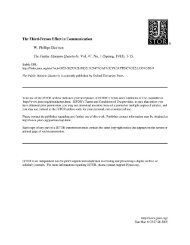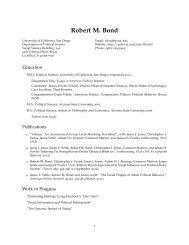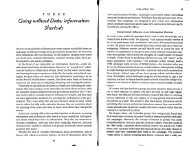Chapter 6 Why Authoritarian Parties? The Regime Party as an ...
Chapter 6 Why Authoritarian Parties? The Regime Party as an ...
Chapter 6 Why Authoritarian Parties? The Regime Party as an ...
Create successful ePaper yourself
Turn your PDF publications into a flip-book with our unique Google optimized e-Paper software.
CHAPTER 6<br />
that single-party regimes “tend to be brought down by exogenous events rather th<strong>an</strong> internal<br />
splits.” <strong>The</strong> present <strong>an</strong>alysis helps us underst<strong>an</strong>d why single-party regimes remain resilient<br />
to elite defections in spite of frequent internal factionalism.<br />
<strong>The</strong> mainten<strong>an</strong>ce of <strong>an</strong> appropriate bal<strong>an</strong>ce in promotion <strong>an</strong>d retirement policies poses<br />
a distinct challenge in domin<strong>an</strong>t party systems. Because these regimes have multiparty<br />
elections, disgruntled juniors who were p<strong>as</strong>sed up for a promotion <strong>an</strong>d seniors who are being<br />
pressured into retirement may challenge the party <strong>as</strong> independents or opposition c<strong>an</strong>didates.<br />
When, in attempts at party “renewal”, Lee Ku<strong>an</strong> Yew pressured senior party members into<br />
political retirement, he reluct<strong>an</strong>tly kept the former government minister Toh Chin Chye <strong>as</strong> a<br />
member of parliament for the People’s Action <strong>Party</strong> because Toh could e<strong>as</strong>ily win his district<br />
<strong>as</strong> <strong>an</strong> independent. Only when the boundaries of his district had been redrawn could Toh be<br />
retired <strong>an</strong>d even then he became one Lee’s most powerful critics (Mauzy <strong>an</strong>d Milne 2002).<br />
Arelated concern shaped theprocess by which presidential c<strong>an</strong>didates for Mexico’s ruling<br />
Institutional Revolutionary <strong>Party</strong> used to be unveiled: <strong>The</strong> incumbent president tactically<br />
delayed the <strong>an</strong>nouncement of the next PRI nominee <strong>as</strong> long <strong>as</strong> possible, so that all in-<br />
fluential cabinet members believed that they stood a ch<strong>an</strong>ce. Otherwise they might have<br />
attempted to defect from the party with enough time to promote <strong>an</strong> independent c<strong>an</strong>didacy,<br />
<strong>as</strong> Cuauhtémoc Cárden<strong>as</strong> did in 1988 after he unsuccessfully tried to win the presiden-<br />
tial nomination within the PRI (C<strong>as</strong>tañeda 2000). Although the official nomination to the<br />
presidential c<strong>an</strong>didacy guar<strong>an</strong>teed the chosen c<strong>an</strong>didate the presidency – <strong>an</strong>d w<strong>as</strong> therefore<br />
technically apromotion–itimpliedpoliticalretirement formostoftheunsuccessful hopefuls.<br />
In fact, Mexico under the PRI provides <strong>an</strong> example of uniquely intertwined promotion<br />
(Bunce 1999; Mawdsley <strong>an</strong>d White 2000; Rush 1991).<br />
23











